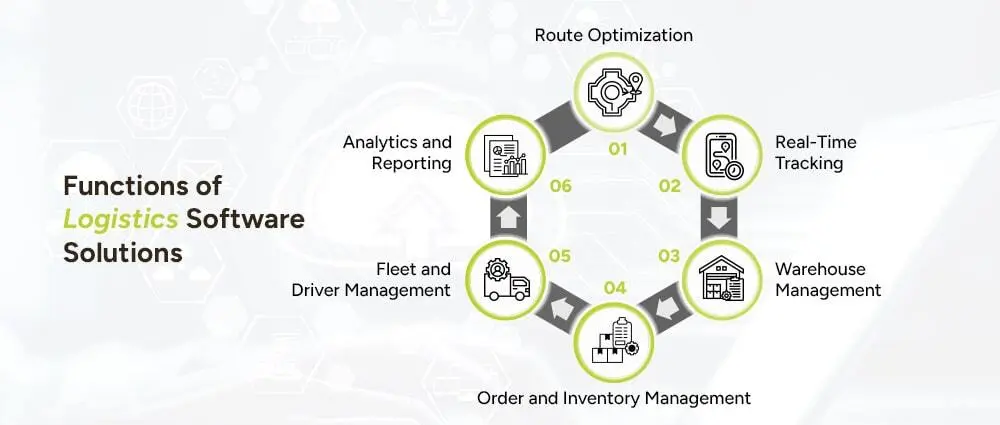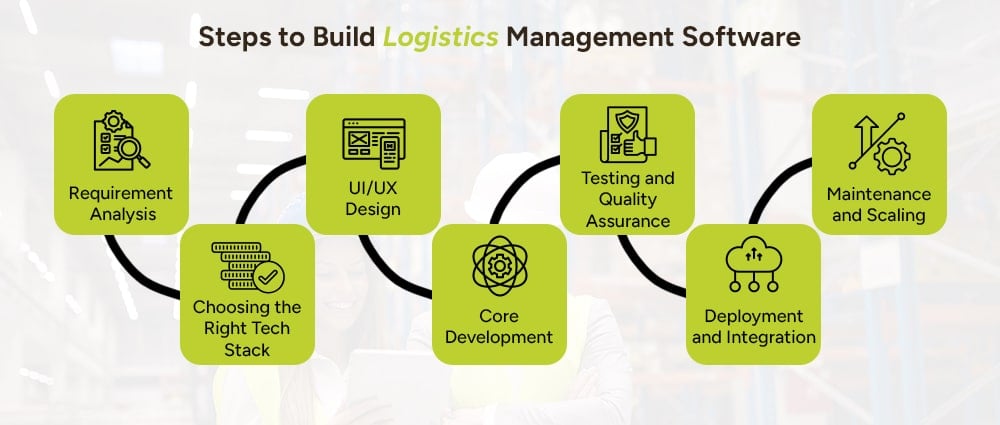The logistics sector is the silent power that maintains the flow of international trade. Through various means such as warehouse management and fleet tracking, logistics companies use technology to move goods efficiently and at competitive rates. However, customer demands are changing and off-the-shelf tools are not enough as they are generally unable to provide the desired level of service. Hence, custom software development for logistics becomes crucial.
A wide range of features, including route optimization, real-time tracking, and unbroken communication between drivers and dispatchers, can be enabled by custom logistics software development, which grants unparalleled flexibility, automation, and control over business operations.
To put it simply, the development of logistics software involves the creation of digital solutions that facilitate and even manage different logistics activities, like shipment handling and delivery route optimization. Among these solutions are:
The partnership with a logistics software development company helps the customers by digitizing their workflows, improving their insights, and offering them more efficient support.
Statista data indicate that the global logistics software market will grow up to $20.4 billion in 2032. That is mainly because of the increased need for automation, visibility, and sustainability in logistics operations.
A Transportation Management System (TMS) is one of the most important components in the logistics tech stack. It’s a type of software that helps plan, execute, and optimize the physical movement of goods.
A TMS integrates data from shippers, carriers, and logistics providers, allowing companies to:
With a strong transportation software development company, you can create a TMS personalized to your unique business operations, whether that’s automating delivery schedules, tracking driver performance, or integrating IoT sensors for fleet visibility.
Modern TMS platforms can even use AI and predictive analytics to forecast delays, identify bottlenecks, and recommend the most cost-efficient shipping routes.

A powerful logistics software solution doesn’t just manage shipments; it transforms how your business operates. Some of the most valuable functions include:
Using algorithms and real-time traffic data, custom logistics software development helps companies plan the most efficient delivery routes, reducing fuel costs, delivery times, optimizing last-mile delivery, and reducing driver fatigue.
Using GPS and IoT, companies are able to see the movement of goods, the location of vehicles, and the performance of drivers at the same time. Also, the consumers are the ones to get the most out of the situation as they receive precise delivery times and have the chance to track the order live.
A logistics software solution can keep up with the inventory, trace each item, and send automated notifications for replenishment. This is how high productivity in the warehouse is guaranteed.
The centralized dashboards give a view of orders, returns, and stocks across various locations, which is quite helpful to ensure the proper coordination of warehouses and delivery fleets.
Watch over the health of the vehicle, the maintenance schedule, and the performance of the driver so that you can minimize the downtime and heighten the safety level.
Data-driven insights help managers identify inefficiencies, forecast demand, and make informed business decisions.
Together, these features streamline operations, reduce manual work, and deliver the agility logistics companies need to stay ahead.
Custom logistics software development investment is a decision with a lot of long-term benefits. The major logistics software advantages are the following ones:
Using smarter routing, predictive maintenance, and efficient resource distribution, companies can cut down considerably on their costs for fuel, workforce, and overall operations.
Every stage of shipment and delivery can be monitored better thanks to the transparent and data-rich insights.
Receiving updates on time, knowing the exact time of arrival, and having fewer delivery errors all contribute to greater customer satisfaction.
A centralized platform connects all stakeholders, drivers, dispatchers, and customers, ensuring seamless communication.
Custom software development for logistics, as opposed to ready-made solutions, matures alongside your business. New functionalities can be incorporated, new technologies can be integrated, and geographical expansion can take place, all without any disturbance.
To put it simply, logistic software solutions shift classic supply chains into intelligent, connected ecosystems that work with exactness and power.

Developing logistics software involves several strategic steps to ensure it aligns with your business goals and workflows. Here’s how a logistics software development company typically approaches the process:
The first step in the process is to pinpoint your logistics difficulties, such as an inefficient route, problems with warehouse management, or no real-time tracking. Your solution will be based on these insights.
The selection of technologies suited for scalability, security, and integration with the current system is done by the developers of the transportation software company. Technologies like React, Node.js, or Python and APIs are among the selected ones.
Due to the fact that logistics operations have a diverse set of users involved, such as drivers, dispatchers, and customers, the interface needs to be very user-friendly, quick to respond, and developed for both mobile and web platforms.
During this phase, the pivotal attributes of the system are developed: route optimization, order management, vehicle tracking, reporting dashboards, and integration with third-party logistics (3PL) systems.
Thorough testing guarantees the solution’s ability to operate effortlessly even during peak times. QA experts check for correctness, speed, and user-friendliness.
After passing the tests, the software gets integrated with your logistics ecosystem, assuring interoperability with ERP systems, CRM tools, and IoT devices.
After going live, a trustworthy logistics software development service provider will keep updating your system, fixing bugs, and adding new modules as per your operations growth.
Building your own logistics management software ensures you have full control, customized to your operations and adaptable to future needs.
If you are still depending on manual spreadsheets, disconnected tools, or old systems, you are already losing productivity. Here are the reasons why logistics software development services are a must-have today:
We, at Arpatech, believe that a good logistics software development company doesn’t just build software; it builds efficiency, visibility, and trust into your supply chain.
At Arpatech, we specialize in custom logistics software development designed to simplify your supply chain operations and enhance profitability.
As an experienced logistics software development company, our team builds scalable and secure solutions tailored to your business needs. Whether you’re a logistics provider, fleet operator, or e-commerce business, we deliver:
Our logistics custom software development services focus on usability, scalability, and measurable ROI.
We also integrate advanced technologies like AI, IoT, blockchain, and predictive analytics to ensure your operations are future-ready.
Partner with Arpatech, a trusted transportation software development services provider, and let us help you optimize your routes, reduce operational costs, and create seamless logistics experiences for your clients.
Yes! The team of Arpatech specializes in the creation of logistics software based on SaaS that enables companies to handle the whole process from any location, to expand without any limitations, and to be connected with other electronic tools via APIs by the means of integration.
Any business that is somehow involved in the process of moving goods or delivering goods, such as transport companies, courier services, warehouses, e-commerce, and manufacturers, will benefit from custom logistics software.
The most popular forms of logistics software are TMS, WMS, Fleet Management Platforms, and Order Tracking Systems. Through custom manufacturing of logistics software, you can join up these functions into one integrated platform that is personalized to your requirements.